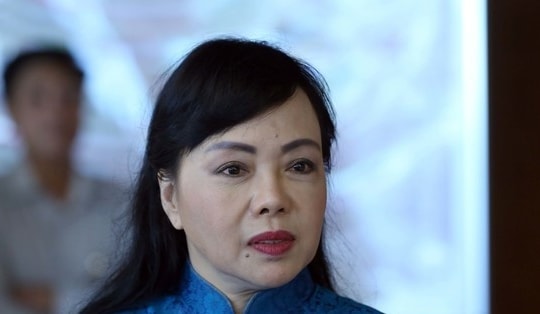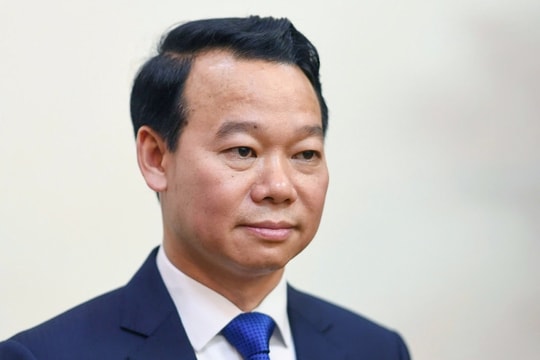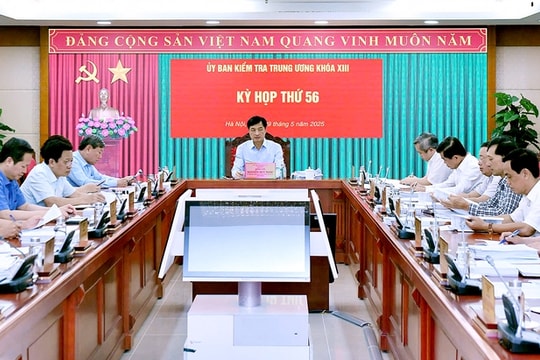Party members who commit especially serious violations and die will still be examined and handled.
The implementation guidelines for Regulation No. 102-QD/TW clearly state that in cases where a party member commits particularly serious violations and dies, inspection, conclusion, and disciplinary action will still be taken.
 |
| The instructions were signed and issued by the Chairman of the Central Inspection Commission, Tran Quoc Vuong, on March 22, 2018 - Photo: TL |
Chairman of the Central Inspection Commission Tran Quoc Vuong has just signed and issued Document No. 04-HD/UBKTTW guiding the implementation of a number of articles in Regulation No. 102-QD/TW, dated November 15, 2017 of the Politburo on disciplinary action against violating Party members.
The guidelines clearly state that in cases where a child commits a crime (biological child, legally adopted child, daughter-in-law, son-in-law living in the family), the Party member must bear joint responsibility; if a Party member violates and is disciplined with a warning or dismissed from office (if holding a position), the competent Party organization shall, based on the regulations, consider and decide specifically: to warn or dismiss one, several or all positions in the Party for that Party member.
For party members who have passed away and their violations are only discovered later, no inspection will be conducted. When an inspection or disciplinary action is being taken and a party member who has committed a violation passes away, only a conclusion will be made and no disciplinary action will be taken.
However, in cases where party members commit particularly serious violations and die, they will still be inspected, concluded, and disciplined.
In addition, many other contents are guided very specifically in this document.
Scope, objects
Clause 2, Article 1 of the guidance stipulates: "Party members who are found to have committed violations after transferring jobs, quitting their jobs or retiring must still be examined and concluded; if the violation is serious enough to require disciplinary action, disciplinary action must be taken in accordance with the provisions of the Party Charter, the laws of the State and the contents stated in this Regulation.".
Party members who, after transferring jobs, quitting their jobs or retiring and have moved to a new party activity, discover violations at their previous party activity location that have not been reviewed and handled shall be reviewed and handled by the direct superior party organization of those party organizations according to regulations.
While considering and handling a party member who has violated the law, if the party organization where the party member is active is dissolved, merged, split or ceases operations, the competent party organization shall continue to consider and handle the matter or report to the party organization directly superior to that party organization to consider and handle disciplinary action against the party member according to regulations.
Disciplinary principles
Clause 3, Article 2 provides: "When considering and handling disciplinary action against a Party member who violates the law, it is necessary to base on the content, nature, level, harm, cause of the violation, aggravating or mitigating circumstances, attitude towards accepting criticism and correcting and overcoming shortcomings, violations, consequences caused, goals and requirements of performing political tasks and Party building work."
When considering and disciplining party members who violate the law, it is necessary to clarify the content, nature, extent, harm, motive, cause of the violation, aggravating and mitigating circumstances, and base it on the attitude of self-awareness, determination to correct shortcomings, violations, and overcome the consequences caused. Conclusions must be drawn based on evidence, without speculation.
At the same time, it is necessary to consider specific, objective, and comprehensive historical circumstances in order to achieve the goals and requirements of political tasks and Party building work.
Party members who violate the disciplinary warning or are dismissed from office (if holding a position) in Clause 2 of Articles 7 to 34, the competent Party organization shall base on the above provisions to consider and decide specifically: Warning or dismissal from one, several or all positions in the Party for that Party member.
Party members who violate the rules are subject to disciplinary reprimand or warning. If they are deemed to no longer have sufficient prestige, the competent Party organization shall decide to dismiss them or propose to remove them from that position.
If sentenced by a court to a sentence of non-custodial reform or higher, the person must be expelled; if sentenced to a sentence lower than non-custodial reform or exempted from criminal prosecution or administratively sanctioned, then depending on the content, level, nature, harm, cause of the violation and aggravating or mitigating circumstances, party discipline will be considered and implemented appropriately.
When Party committees, standing committees of Party committees and inspection committees from district level and above discover that Party members have committed violations to the extent that criminal liability must be prosecuted, they must transfer the case to the competent judicial agency for consideration and handling, and must not retain it for internal handling.
If a Party member who violates the law is being handled by a competent law enforcement agency according to the provisions of the law, the Party organization must not intervene so that the Party member is only subject to Party disciplinary action, not criminal prosecution or administrative or union action.
Within 15 days from the date the court's verdict sentencing a party member to non-custodial reform or higher takes legal effect, the court must send a copy of the verdict to the Party Committee, the Party Committee Standing Committee, or the Party Committee Inspection Committee managing the party member. Based on the content of the verdict, the Inspection Committee shall decide or propose that the Party Committee or the Party Committee Standing Committee decide to take disciplinary action to expel the party member according to regulations.
The statute of limitations for disciplinary action is calculated from the time of the violation.
Clause 1, Article 3 stipulates: "The statute of limitations for Party disciplinary action is the time limit specified in this Regulation, after which a Party member who commits a violation will not be subject to disciplinary action.".
Any Party member who commits a violation at any time must be examined, clarified, concluded and voted on by the competent Party organization for a specific form of discipline. Then, based on the voting results and compared with the regulations on the statute of limitations for disciplinary action, a decision will be made to enforce or not to enforce discipline on the violating Party member.
For example: Party member A committed a violation more than 10 years ago when the disciplinary review was considered. The competent party organization, after reviewing the content, nature, and level of the violation, voted to decide on disciplinary action with the result being a warning.
According to the regulations on disciplinary statute of limitations, at the time of the disciplinary decision, the statute of limitations for disciplinary action had expired, so that party member would not be subject to Party discipline. In case the voting result is in the form of expulsion, according to the regulations on statute of limitations, that party member will be disciplined by expulsion.
Point b, Clause 1, Article 3: "The statute of limitations for disciplinary action is calculated from the time of the violation. If during the disciplinary action period prescribed in Point a of this Clause, a Party member commits a new violation, the statute of limitations for disciplinary action for the old violation shall be recalculated from the time of the new violation.".
For example: Party member A committed a violation on May 2, 2015 and is still within the disciplinary statute of limitations. On September 8, 2017, he commits a new violation. The statute of limitations for the old violation will be recalculated from September 8, 2017. The competent Party organization will review each violation and make a general decision on a disciplinary measure.
- The statute of limitations for disciplinary action is calculated from the time of the violation to the time the competent party organization issues a decision to inspect and consider disciplining the party member; in case of continuous violations, the statute of limitations is calculated from the time the violation ends.
For example: Party member A has committed continuous violations for a period of 3 years (from March 8, 2013 to March 8, 2016), and has only recently been discovered to have committed violations during that period, the statute of limitations is calculated from the time the violations ended on March 8, 2016 until the competent party organization decides to inspect and consider discipline.
The statute of limitations shall not be recalculated for party members who have been disciplined but later the superior party organization decides again (to approve, increase or decrease) the disciplinary measure against that party member.
For example: Party member A is disciplined with a reprimand, that party member appeals to higher-level party organizations; the party organization that resolves the appeal finally decides to approve the disciplinary action of reprimand against that party member (the time from the time of the violation to the time of the final decision to resolve the appeal is over 5 years), because the statute of limitations is not recalculated, that party member must still comply with the disciplinary decision of the higher-level party organization.
Particularly serious violations, death still checked, concluded and handled
Clause 1, Article 5 stipulates: "Party members who commit violations and are pregnant, on maternity leave, suffering from a serious illness or losing the ability to perceive, or are seriously ill and receiving inpatient treatment at a hospital as confirmed by a competent medical agency as prescribed by law (from district level or higher) will not be considered for disciplinary action.".
- "Critical illness" is an illness that is life-threatening to the infected person as prescribed by a competent state agency.
- The time period not yet considered and handled as above disciplinary action is not counted in the statute of limitations for handling Party disciplinary action.
For example: Party member A committed a violation 4 years ago. When the competent Party organization considered and disciplined him, he fell ill and had to be hospitalized. This treatment time is not counted in the statute of limitations for disciplinary action.
Clause 2, Article 5 stipulates: "Party members who have committed violations and passed away, the Party organization will review and conclude, and will not take disciplinary action, except in cases where the red Party members have committed especially serious disciplinary violations.".
If a Party member dies and then a violation is discovered, no inspection will be conducted. If a Party member who committed a violation dies during an inspection or disciplinary review, only a conclusion will be made and no disciplinary action will be taken.
In case a party member commits a particularly serious violation and dies, it will still be inspected, concluded and disciplined.
Regarding instructions on handling violations in crime prevention and control, Point d, Clause 1, Article 13 stipulates: "Lack of responsibility in management and education leading to spouses, children or direct subordinates committing crimes".
Specifically, children of party members who commit crimes for which party members must bear joint responsibility include: biological children, legally adopted children, daughters-in-law, and sons-in-law who live and work in the family and are directly dependent on the upbringing and management of that party member.
Violations of complaints, denunciations and settlement of complaints and denunciations
Point a, Clause 1, Article 15: "Writing anonymous or fake complaints. Writing and signing the same complaint with others.".
- An anonymous complaint is one that is not signed and does not state the full name. An anonymous complaint is one that is signed or has another person's name on it.
- Directly write a complaint for many people to sign.
- Draft the outline, dictate the content of the complaint for others to rewrite, type or type yourself, then sign the complaint with others.
Point d, Clause 1, Article 15: "Lack of responsibility, causing trouble or harassment in resolving complaints and denunciations or causing difficulties or hindering party members and citizens in exercising the right to complain and denunciation."
- Received complaints and denunciations within the authority and responsibility to resolve but ignored, not considered or resolved.
- Not considering and resolving complaints and denunciations in a timely manner according to the time limit prescribed by the Party and the State's laws without justifiable reasons; resolving them objectively; disclosing the identity, address, and handwriting of the complainant to organizations and individuals who are not responsible for knowing.
- Provide the full text or part of the complaint or deliver the complaint to the accused.
- Self-imposed regulations or requirements contrary to Party regulations and State laws for complainants and denouncers.
- Do not transfer complaints (not under the jurisdiction to resolve) to the agency, organization or individual responsible for resolving them.
- Failure to notify the complainant of the results of the complaint settlement (in an appropriate form).
Point d, Clause 2, Article 15: "Threatening, retaliating, suppressing, or insulting people who discover, report, denounce, accuse, provide information, documents, or evidence about corrupt or negative acts, or people responsible for handling complaints and denunciations"
- Verbally or through others threatening to infringe upon the life, health, property, honor, dignity, rights and legitimate interests of the whistleblower.
- Preventing or making it difficult for whistleblowers to exercise their legitimate rights and interests in promotion, salary increase, rewards, appointments and other legitimate rights and interests.
- Discriminating against or enticing others to obstruct the performance of duties and public service of the whistleblower.
- Handling against Party regulations and State laws, changing the job of the whistleblower with the intention of repression.
- Directly or hire or ask others to threaten, suppress, retaliate, bully, control, or slander the person directly handling complaints and denunciations.
- Directly meeting, calling, texting or using other actions to put pressure on the person directly handling the complaint or their superiors in order to distort the content of the complaint or denunciation resolution.
Point g, Clause 2, Article 15: "Fabricated accusations, slander, attacks, defamation, damage to the reputation, honor and dignity of others".
- Reporting things that you know do not exist or making up stories, making up stories, thinking of untrue things to report.
- If a Party member exercises the right to denounce but the competent authority concludes that the content is correct, incorrect, or correct in terms of the phenomenon but incorrect in terms of the essence, the denunciation is not considered fabricated or slanderous.






.jpg)

